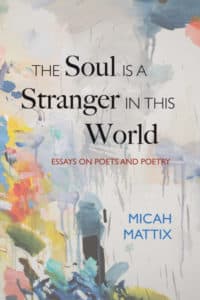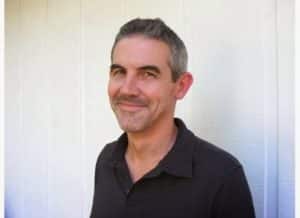Is the poet a revolutionary, a radical helping to prod, drive, and lead humanity to create a more just world? The early William Wordsworth seemed to think so. Indeed, the Romantics helped drive an understanding of the role and work of the poet that was different from what had been understood before.
Literary editor, essayist, and professor Micah Mattix has a different view. “In the classical view,” he writes in The Soul Is a Stranger in This World: Essays on Poets and Poetry, “the poet is not a Delphic oracle babbling esoteric lines unintelligible to the uninitiated, not a political mouthpiece of the regime or the revolutionaries, but the companion of the common man, sitting beside him, helping him wrestle with the questions he has, seeking first to understand and give meaningful expression to the problems and experiences and frustrations of life—to hint, suggest, explore, and point towards possible answers.” This poetry, he says, draws together a community and articulates its hopes and fears.

Rilke, he says, was bedeviled by God, or by what he called God. A number of critics have tried to reduce Eliot’s The Waste Land to an account of his unhappy home life; Mattix says the work is about more—the decline of the old order, the act of remembering, and the pain the poet was expressing about both. The World War I poets are today considered to have been pacifists, but that’s not at all what most of them were. Robert Frost is thought to have cared either too little for people or too much; Mattix points to another factor reflected in his poetry—the importance of his family life. Many like to consider E.E. Cummings a rebel of sorts; Mattis wonders if it was more of a case of his being spoiled.
Quietly and without fanfare, Mattix suggests alternatives to prevailing ideas and theories about both poetry and poets, including a concise essay about why surrealism never worked for poetry. He also has fun with his essays; in a review of Glitter Bomb by Aaron Belz (also reviewed here at Tweetspeak Poetry), he calls Belz an “avant-garde Presbyterian,” noting both his family background and his studies under Allen Ginsberg and Philip Levine.
Many of the essays and reviews included in The Soul Is a Stranger in This World were previously published in newspapers, online news sites, and literary journals. The author revised and expanded them for this volume and included a number of new articles as well.

Micah Mattix
Mattix is an associate professor of English and currently serves as the English & Communications Studies chair at Regent University. His research interests include modern and contemporary poetry and fiction, and criticism. He’s a member of the National Book Critics Circle and the Association of Literary Scholars, Critics and Writers. He’s also a contributing editor to The Weekly Standard and the author of Frank O’Hara and the Poetics of Saying “I.”
Though an academic, Mattix avoids using esoteric language in these essays and articles. It’s rather refreshing to read a literary critic who is writing for the rest of us, that community of people who love poetry not because it leads us to the barricades but rather because it speaks to the experience we’re living and the questions we’re contending with. And it offers a decidedly different perspective on a considerable number of familiar poets.
Photo by sagesolar, Creative Commons, via Flickr. Post by Glynn Young.
__________________________

“I require all our incoming poetry students—in the MFA I direct—to buy and read this book.”
—Jeanetta Calhoun Mish
- Longfellow’s “Paul Revere’s Ride”: Creating a National Legend - April 17, 2025
- Poets and Poems: Katie Kalisz and “Flu Season” - April 15, 2025
- Poets and Poems: Michelle Ortega and “When You Ask Me, Why Paris?” - April 10, 2025

Leave a Reply